
 |
| A woman is selecting a new huangli at a vendor's stand. (File Photo) |
Ancient tradition of 'huangli' still popular in modern times
A pair of chunlian (Spring Festival couplets), two lucky characters, several firecrackers and a new calendar are common things to buy for most Chinese families before the start of a lunar new year. And very traditional families will prefer a huangli to a normal calendar.
Similar to horoscopes in the Western World, huangli can be referenced to tell the fortune of people for a certain date, and people of differing Zodiac signs will have different fortunes. But while most Western people regard horoscopes only as entertainment, most Chinese take a more serious attitude toward huangli. They are most likely to refer to it when scheduling a big event like a wedding, moving to a new house, opening a business, or having a funeral. It's a common practice even for people who don't believe in it.
What is a huangli?
In Chinese, "huang" refers to the emperor ("huang" is also written with the character meaning yellow as the Chinese ancient emperors often wore yellow) and "li" refers to the calendar. Just as the meaning goes, huangli were originally only issued out by the royal authority.
Different from the Chinese lunar calendar, which is written according to the cycle of the moon and the solar calendar, which is based on the sun's movement throughout a year, huangli is a chronometry combining both.
According to Zeng Qiangwu, a retired official of Hunan Province's Yiyang Meteorological Bureau who has been studying and writing huangli since the 1970s, as early as the Spring and Autumn Period (770-467BC) there were already huangli books being used, and many people believe they were part of Chinese people's culture much earlier.
In ancient times, there were certain officials in charge of writing huangli, and a number of them are well-known figures in history including mathematician Zu Congzhi (429-500), astronomer Guo Shoujing (1231-1316) and agronomist and scientist Xu Guangqi (1562-1633).
"The earliest use of a huangli was to record the [movements] of the sun, the moon, big issues of the nation and government, and the emperors' words and deeds. Later, things like the Heavenly Stems and Earthly Branches, monthly climate and phenology, twenty-four solar terms, and divinations were added in," Zeng told the Global Times.
The chaos of too many
While its functions as an agricultural activities guide book and fortunetelling book were equally important for ancient Chinese, modern people today seem to only care about the latter. And compared with other ways of divination, such as consulting a fortuneteller, huangli is much easier to get. And due to its long history and previous authority, it feels more trustworthy in the minds of Chinese people.
Huangli has been so popular among the Chinese that there are not only various publications available in bookstores and even vendors' stands, but now they are also on the Internet.
Unfortunately, widespread availability has resulted in inconsistencies. A one-to-one comparison by the Global Times revealed that on the same day different publications or websites give just the opposite prediction: one said it was an extremely lucky day for a wedding while another called it the worst day to do so.
It seems that nowadays very few people really have the knowledge to create huangli.
A netizen with the name "Na Si" said that when she wants to look up a huangli, she searches the Internet. "I don't know which one is more reliable and therefore I make comparisons of them. When a number of them give similar information, I will trust in it," she said.
In a casual chat with the monitor of website huangli8.com, the Global Times was told that all the information provided there comes from "an authoritative institution" - the China Zhouyi Association. Zhouyi, or the Book of Changes, is one of the oldest Chinese classics and contains a divination system. And the monitor said "whether you believe in it depends on you."
A fortuneteller surnamed Shi shared a similar opinion. "It is a matter of personal choice," he said.
These opinions are supported by Zeng, who explained that while the information on climate and seasonal changes are authoritative and useful for farming, how the divination is told depends on the different fortunetellers.
This apparent flaw, it turns out, is also part of the tradition. Many times in history, the government-issued huangli only provided information on farming. They let the civilian fortunetellers interpret it in their own way.
"These were called superstitions in the old days, but I don't think all of them are. Some are based on [old classics like] bagua (eight diagrams). There are certain scientific bases," Zeng said. "We need to believe in such science, but today's huangli also differs."
Who writes huangli?
Then is Zhouyi the knowledge behind huangli? Zhou Shan, director of The Institute of Philosophy, Shanghai Academy of Social Sciences, said in a phone interview with the Global Times that in fact, though both Zhouyi and huangli have divination, the two are based on different knowledge systems. "Huangli is more related to meteorology," he said.
And Zhou thinks huangli is not that reliable in predicting the fortune of a person on a given day. "[According to Zhouyi] many more factors need to be taken into consideration when casting a person's fate and fortune, such as the birth time. Even within the same day, the luck or unluckiness differs according to the hour. Therefore, it cannot simply say which day is extremely lucky to do something for everyone," he explained.
As a compliment to Zhou's answer, Zeng said that to write a huangli one needs to have a variety of knowledge, in which astronomy, meteorology, geography, chronology, folk customs and bagua are the major ones.
Yet, the number of such qualified huangli writers is limited in recent years.
"[The number of real huangli writers] is only a few," according to Yang Hui, an employee at China Meteorological Press. "The younger generation is still in the process of study and it is not easy and fast to learn."
As for the various publications in the market, Zeng said, "There are all kinds of [huangli] and in an infinite variety of fantastic phenomena. [But the interesting thing is that] the stranger a huangli is, the more people are going to buy it. Even some big bookstores are filled with such books."
"It seems really difficult to get a real authoritative huangli," he added.


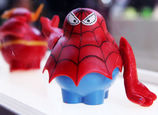

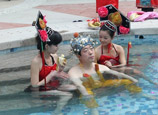
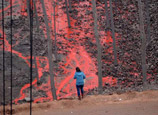
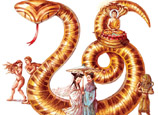

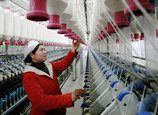







 A 9-year-old girl and her father are traveling to 31 major cities across China on foot and by hitchhiking.
A 9-year-old girl and her father are traveling to 31 major cities across China on foot and by hitchhiking.


![]()
